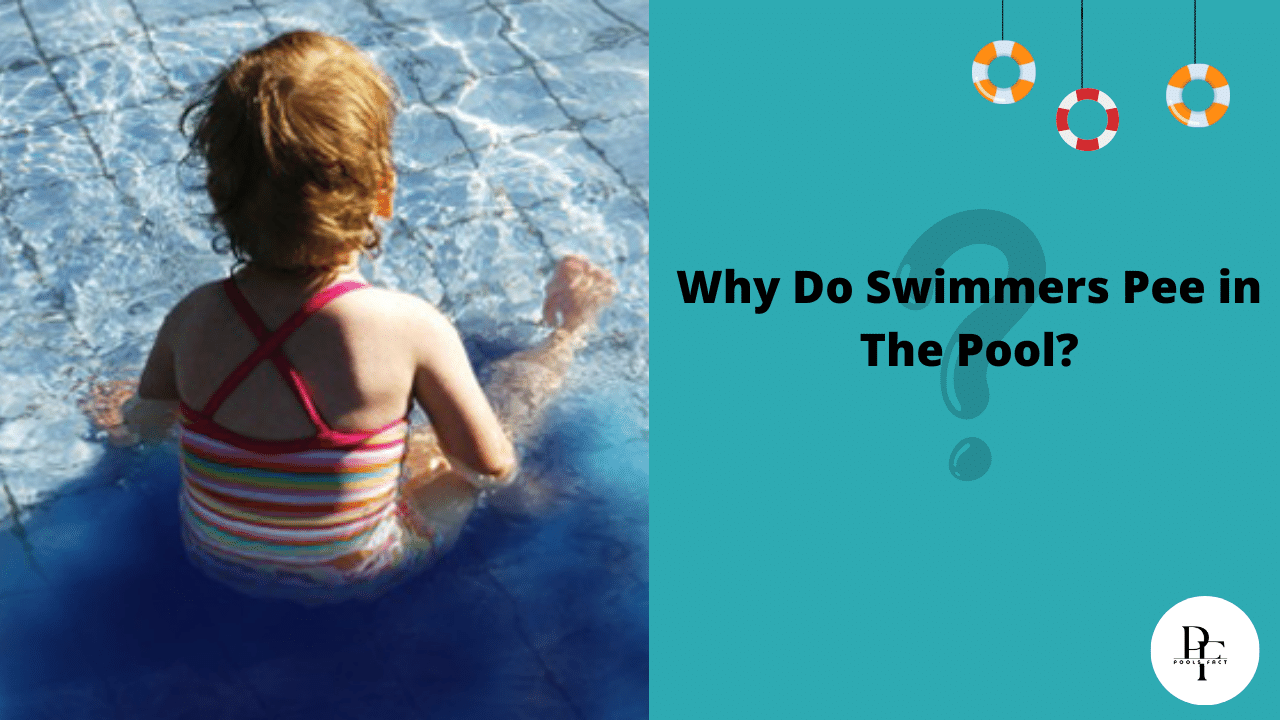We are aware that some people like using the ocean as a public restroom to urinate and defecate. But their contribution to waste is like a drop in the biggest bucket in the world; it quickly dilutes and ceases to be a problem.
Peeing in it suddenly becomes more of a problem, though, if you scale things down to the size of a swimming pool or even your own personal pool. There is a lot less water, which means there is less dilution (and defecating is strictly not allowed). You swim and lounge in an unknown amount of urine each time you use the pool.
A small amount of urine will typically not have a measurable impact in a large swimming pool because the concentration of urine is too low. But over time, the concentration will rise if many individuals keep urinating in the pool. And draining the pool and filling it up with fresh water is the only way to get urine out of the water.
Do Olympic Swimmers Pee in The Pool?
Given how frequent peeing in the pool is, it is not strange that public swimming pools are occasionally called cesspools. The oft-cited statement that “chlorine kills urine” is true, but does it really? Even the greatest Olympian in the world, Michael Phelps, admits to peeing in the pool because “everyone pees in the pool.”
Why Do Swimmers Pee in The Pool?
Swimmers pee in pools for a variety of reasons. The most common explanation is that they are simply too lazy to get up, dry off, and use the restroom. They fail to realize that they will be swimming in other people’s pee if everyone defecates in the pool.

1. Swimming Causes Urination
It’s not like swimmers didn’t use the restroom before diving in. The physical exercise of swimming releases burns calories and pee in the pool. The bladder may fill up more quickly and exert more pressure when a person is swimming. It can be too difficult for the swimmer to hold on till they can get out of the water.
2. This Disrupts the Gym Work.
not only for the swimmer, but also for the rest of the team Being tough and enduring the challenging, demanding sets is a significant element of swimming culture. One would think that leaving early to use the restroom means skipping the difficult labor. This choice is unappealing just due to the guilt.
3. Too Cold to Go Outside
Once a swimmer has warmed up in the pool, they are reluctant to leave because doing so will leave them wet and subject to evaporative cooling. They would need to get dressed, dry off, use the restroom, get back into the pool, and rewarm up. They think that getting out of the pool would mess up their workout or time to relax a lot.
4. Being Unaware of The Coach’s Instructions.
Asking questions regarding the set after it has been taught to you is the best way to frustrate a coach or colleague. The complexity of a swim training on a whiteboard may be difficult for non-swimmers to comprehend, but it’s also not written in simple terms. There are arrows, numerals, brackets, abbreviations, etc. Even if you can read the exercise, you can still miss the main objective of the set.
5. Disregard and Laziness.
Unfortunately, a lot of folks are just too careless and lazy to get out of the pool when they need to urinate. This frequently occurs in public swimming pools, particularly when there are plenty of kids around.
6. when Competing, We Don Our Racing Outfits.
Watch this video to learn what I mean (note: some language). Then picture yourself as a female who needs to jump out of the pool, run to the restroom, take off her racing suit so she can urinate, and put it back on while shivering and cold.
What Affects a Pool Does Urine Have?
Urea, uric acid, electrolytes, dead cells, and other waste materials make up urine. It’s extremely improbable that someone peeing in your pool will cause you to become unwell, though.
The free chlorine in the pool water is consumed when someone urinates in it. Free chlorine kills all germs and other organic compounds that could be dangerous, but it can’t get rid of pee.
The pee stays in the pool after mixing with the water.
The chlorine chemical reaction won’t be able to sterilize the pool water if there is more urine present. The pool will have trichloramines, which give off an unpleasant chlorine or ammonia stench.
Do not swim in a pool if the odor is overpowering!
The pool needs to be shocked chlorinated till the unpleasant smell goes away. The absence of smell implies that all of the chloramines have been transformed into nitrates and that the chlorine reaction cycle has come to an end.
Does Chlorine Remove Urine from Pool Water?
No, chlorine doesn’t get poop out of swimming pool water.
Germs and viruses in urine can be killed by chlorine, but urea and uric acid can’t be taken out with chemicals.
There is little you can do if someone urinates in your pool.
Since urine makes up a very small portion of the pool’s overall water volume, there won’t be any noticeable effects.
Does Chlorine Kill Pee?
No, urine cannot be killed by chlorine. The fact that chlorine eliminates microorganisms and keeps the pool sanitized has become widely known. The implication is that chlorine also poisons urine as a result. Technically, that is not accurate.
As Bear Grylls famously showed, pee is safe enough for you to drink even if it is not sterile, as many people wrongly believe. This is due to the fact that just 5% of it is made up of waste materials like calcium, nitrogen, and potassium, with the rest 95% being water.
When ingested in large quantities, this 5% of waste products can be problematic. There can be an interesting chemical reaction between the chlorine in the pool and these same wastes.
Urine and Chlorine’s Chemical Reaction
What precisely does the chlorine do when someone pees in the pool and introduces urine to the pool water?
When chlorine and urine meet, a chemical reaction takes place that is hazardous to us and does not destroy or remove the bacteria.
Urea is one of the waste products found in urine, and it reacts with chlorine to form cyanogen chloride. Cyanogen chloride functions similarly to tear gas, causing severe damage to the eyes, nose, and lungs to the extent that it is even recognized as a chemical warfare agent. Think about that the next time you open your eyes underwater without swimming goggles on.
As unsettling as this may sound, why are people so used to it that peeing in swimming pools has become the norm for many people? This is due to the fact that the levels of cyanogen chloride are so low that they are essentially unimportant.
In order for cyanogen chloride to kill a human, literally millions of people would have to urinate into the pool until there was more pee than pool.
Therefore, is it acceptable to urinate in the pool? Yes, you are allowed to urinate in the pool, but nobody will advocate for you to do so. Peeing in pool still depletes chlorine, which is necessary to keep the water free of microorganisms. Try to avoid peeing in the pool because it is disgusting and not hygienic to swim in it.
How Can I Check if A Pool Has Urine?
The water in a pool cannot be tested, particularly for pee.
All of the most popular hydrochemistry markers will be tested by all of the current pool test kits and strips, although they cannot detect the presence of urea or uric acid. Additionally, since uric acid is present in perspiration and saliva, even if they could demonstrate uric acid, it would be useless. The pool might not contain any uric acid.
It’s more crucial to keep your pool’s chemistry balanced and chlorine levels high enough to disinfect dangerous organic compounds.
How to Prevent Peeing in Your Swimming Pool?
Education is the most effective technique to deter individuals from urinating in your pool. Inform your relatives and friends that it’s not okay to urinate in the pool, so, “don’t pee in the pool”. Inform them of any potential health risks and direct them to the nearest restroom.
- Install a sign identifying the restroom.
- Put up a sign saying that the pool is not a bathroom.
- Plan swimming breaks.
- Reduce Your Pool Time
How to Minimize Pool Urination?
It’s true in this situation as well, that “an ounce of prevention is worth a pound of cure.” Here are some suggestions for lowering the amount of urine in the pool.
- Swim in the shower before diving in. This is standard protocol in swimming pools, but you might forget to follow it at your own pool. This works because urine undergoes a similar chemical reaction to sweat when chlorine and uric acid are mixed. So, technically, we’re not getting rid of urine, but the end result is the same.
- Before entering the pool, use the restroom. Did you know that peeing in pool is more likely when you’re in cold water? All people experience immersion diuresis, a phenomenon that is responsible for this. If you go to the bathroom before you get in the pool, you’re less likely to have to go while you’re swimming.
- Tell your friends that urine cannot be killed by chlorine. You might be able to persuade them that using the pool to relieve themselves is not as risk-free as they believe. You won’t have to deal with as much urine the next time you hold a pool party if you do it that way.
How to Handle Urine in Swimming Pool Water?
Just to be clear, there is no way to “remove the urine” by pulling it out with a filter or something similar once it is in the pool. The best course of action is to neutralize and degrade it, making it appear as though there is no pee in the pool. Other suggestions are as follows:
- A healthy chemical, circulatory, and filtration balance. Even though it’s easier said than done, following through with these recommendations can help keep the issue at bay. Make sure your pump and filter are up-to-date and working properly. You should also have a pool water test kit so you can keep track of the level of chemicals in the water and top off any that are becoming low.
- Include enzymes. Chlorine’s efficacy can be increased by combining it with specialised compounds like enzymes. The quality of the water in your pool will significantly improve because enzymes are far better than chlorine at degrading organic material like urea.
- Utilize systems for secondary disinfection. Ozone and UV are a few well-liked ones that can help chlorine do its job of disinfecting your pool even better.
- As you can undoubtedly tell, preventing this issue before it arises is far simpler than dealing with the consequences. If not, you will be compelled to use significantly more chlorine than you would like, in addition to a number of other “boosters” to increase chlorine’s efficiency. All of these additional chemicals need time and money that we currently don’t have enough of.
The widespread misconception that it’s okay to urinate in swimming pools has led many pool owners to neglect their pools’ upkeep. Many people routinely urinate in pools, whether they are their own or public ones, as a result of this prevalent mentality. Keep the peeing in the pool to a minimum because doing so is unhygienic and can risk the chloramines being used up quickly.
We hope you will like our guide “How to remove urine from pool”. If it satisfies your query, you can follow us on our social media accounts.

Leave a Reply